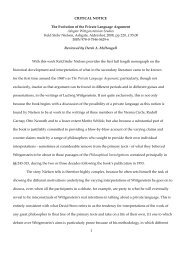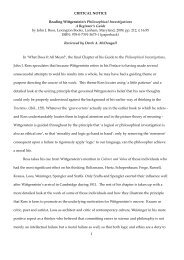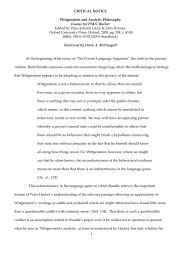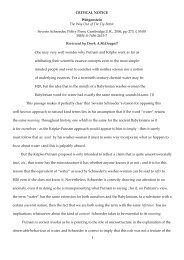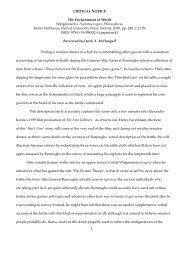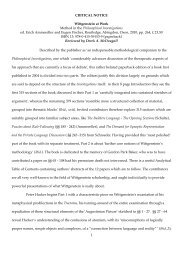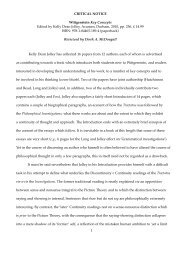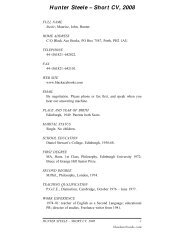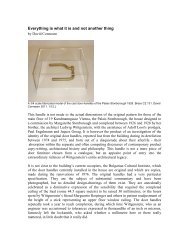Wittgenstein's Philosophical Investigations A Critical Guide
Wittgenstein's Philosophical Investigations A Critical Guide
Wittgenstein's Philosophical Investigations A Critical Guide
You also want an ePaper? Increase the reach of your titles
YUMPU automatically turns print PDFs into web optimized ePapers that Google loves.
All words are names, and the meaning of a word is nothing<br />
but the object it names. Furthermore all names are proper<br />
names, and the meaning of every basic proper name in a basic<br />
proposition (whether a basic singular term or a basic general<br />
term - a.k.a. a ‘concept-word’) is nothing but the referent or<br />
bearer of the name, i.e. an absolutely simple individual concrete<br />
object or a definite abstract concept or universal. (Ibid.,16, repeated<br />
as Step A in 20, and appearing again in 28).<br />
Quoting § 1, Hanna sees ‘the Augustinian language-game’ as what he refers to as<br />
‘a diorama of Pure Referentialism’, anticipating Cartesian epistemology and metaphysics of mind,<br />
Husserl’s semantic phenomenology, Carnap’s ‘methodological solipsism’, not to mention the<br />
transcendental semantic solipsism that Wittgenstein is shown to have adhered to in the Tractatus,<br />
a solipsism referred to in § 24 and countered in the later Private Language Argument (Ibid., 27).<br />
For many readers, this overtly theoretical approach, with its only too sweeping historical survey<br />
of past philosophers, will seem superficial, blurring important distinctions and begging too many<br />
questions. Nevertheless, Robert Hanna has managed to provide within a fairly small compass as<br />
good and thought-provoking a theoretical assessment as anyone probably could of the artillery that<br />
Wittgenstein marshalls to attack and successfully destroy the Tractarian target he is usually taken to<br />
be aiming at in those opening passages of the <strong>Investigations</strong>. We are probably unlikely to see its like<br />
again soon. This is particularly true when at present the interpretative pendulum has swung in a<br />
completely opposite direction, whether the concept of therapy with which it is accompanied in any<br />
particular case is of an extreme person-relative and person-specific kind or not.<br />
Whilst in his own way Michael Luntley in ‘What’s doing ? Activity, naming and Wittgenstein’s<br />
response to Augustine’, adopts a no less theoretical approach to those early passages of the <strong>Investigations</strong><br />
which occupy Hanna, he discovers a more approachable Augustine, largely because the question which<br />
occupies him relates to a different yet wholly familiar aspect of these early sections. To what extent can<br />
6



